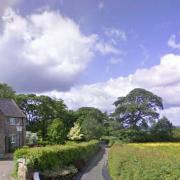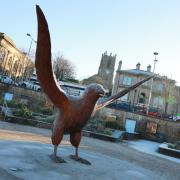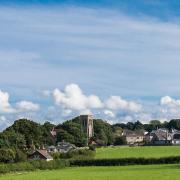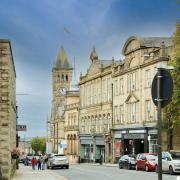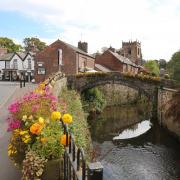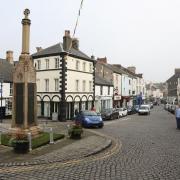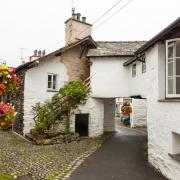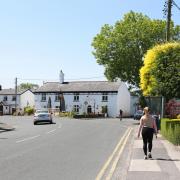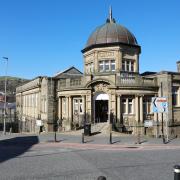As we prepare to celebrate Lancashire Day on November 27, writer Malcolm Greenhalgh tells us why we should be proud of the red rose county

Ever since someone in Whitehall reorganised the local authorities in 1974 there has been confusion about what ‘Lancashire’ really is.
Traditionally, The County Palatine extends from the Mersey north to the Duddon and western shore of Windermere. It still does. In 2013 the present government once again confirmed that the 1974 Act did not affect that. It simply hived off the administration of parts of traditional Lancashire to others, including north Cheshire, and the invented Greater Manchester, Merseyside and Cumbria.
So my own south Lancashire village of Lowton is administered as Greater Manchester, its post code is WA3 (Warrington, Cheshire) and postal sorting office Earlstown (Merseyside). Yet we are all part of The County Palatine and should be proud of it.

Until the Industrial Revolution Lancashire vied with Cornwall as the poorest of English counties. But then, in little more than a century, everything changed, and we became one of the wealthiest. It was all down to coal, cotton and the chemical industries. At the start, the county was, as it were, a blank canvas needing an infrastructure to make development possible. Because of this, we pioneered much that the rest of the UK, and often the world, adopted and now takes for granted.
Transport is the classic example, for into the 18th century the roads were dreadful. So, to enable coal and cotton to be moved quickly, Britain’s first canals were built here: the Sankey Navigation and Douglas Navigation were based on rivers of the same name while the Duke of Bridgewater’s Canal at Worsley (1759) was the first true canal. Today the longest canal in Britain is the Leeds-Liverpool (120 miles) while the world’s shortest is the Ulverston Canal (just under one mile).
The much speedier railway followed. On September 15 in 1830 the world’s first time-tabled train service started to run between Manchester and Liverpool, and when MP William Huskisson tried to get a better view he became the world’s first railway fatality. Later, in 1905, the Southport-Liverpool line became the world’s first electric railway.
Road, to a large degree, followed railway. The East Lancashire Road (A580) was Britain’s first intercity highway; work began on 29 April, 1929 and it was opened by King George V on 18 July, 1934. And Britain’s first motorway was the M6, Preston Bypass, opened by Prime Minister Harold Macmillan on December 5 1958.

Other ‘firsts’ for Britain include Preston’s street lighting (by gas), council housing in Liverpool, paper mill at Euxton, the municipal library at Salford (opened 1850), and the first town parks (Avenham in Preston and Peel in Salford, both in 1841). Goodison Park (Everton) was the world’s first purpose-built football stadium, and the world’s first floodlit football match took place in 1878 between Blackburn Rovers and Accrington Stanley. The Co-op, now a chain of small supermarkets, was founded in Rochdale in 1884, and the oldest shop in Britain is Chipping post office (it began serving customers in 1668 although the post office no longer exists).
Our Palatine County status continues. With 6 million visitors each year, Blackpool Pleasure Beach is the UK’s Number One attraction. The Arndale Centre is the largest indoor shopping centre, the MEN Arena is Europe’s largest indoor concert venue, and at 171 metres Beetham Tower is the tallest residential building in western Europe.
Wigan’s Trencherfield Mill has the world’s largest working steam engine, Cowman’s sausage shop in Clitheroe has more varieties (up to around 80) of sausage than any other, Byrnes’s, also in Clitheroe, is the best wine shop outside London, according to expert Jancis Robinson, Kenyon Hall the biggest pick-your-own farm, Mrs Kirkham’s Lancashire cheese is Europe’s prize winning non-pasturised milk cheese, and the Port of Lancaster Smoke House’s own kippers and smoked eel are on the list of top 20 gourmet foods.
Lancashire has the top, prize-winning markets in Bury and Bolton, with Preston, Ashton-under-Lyne, Warrington and Lancaster not too far behind. And it was here that Vimto, Uncle Joe’s Mintballs, Fisherman’s Friends and the ice cream cornet were invented. The cornet? Yes, the ice cream cornet (the biscuit cone that hold the ice cream) that people eat around the world was invented in Manchester in 1905!

Great Lancastrians to celebrate? Here’s just a very few: the Beatles and Cilla Black, Sir Thomas Beecham, Bernard Cribbins, Richmael Crompton (of Just William fame), Ken Dodd, George Formby, Grace Fields, Mike Harding, Dame Thora Hird, Stan Laurel (there is a Laurel and Hardy museum in Ulverston), George Melly, Eric Morecambe, Robert Powell, Robert Shaw (of Jaws!), Eric Sykes and John Thaw. The word ‘Dinosaur’ was invented by Lancastrian Richard Owen and our own Wallace Hartley deserves a moment’s silence, for it was he who kept the band playing as the Titanic sank.
As for sport, Lancashire is the only county with two golf Open Championship courses (Royal Lytham and Royal Birkdale). In football, of the eleven players who won World Cup medals for England in 1966 four were Lancastrian (Alan Ball, Roger Hunt, Sir Geoff Hurst and Nobby Stiles), when the FA was founded in 1888, six of the twelve founding members were from our county, and the most successful British team is Manchester United. The Grand National is the world’s greatest steeplechase.
And all that in a county with the largest expanse of sand dunes in Britain (Southport-Crosby), the second largest but loveliest bay (Morecambe Bay), and Britain’s finest saltmarshes with, in winter, Europe’s largest wild duck flock (wigeon, on the Ribble estuary, that have numbered around 100,000). Go a short distance inland, and there we have in Bowland some of the finest heather moor in the world, and in the valleys, some of the most beautiful rivers, Hodder, Ribble and Lune.
Lancashire Day is on November 27, marking the day, in 1295, when the first Lancastrians went to London to represent our county in parliament. Drink a toast: The Queen, Duke of Lancaster! Such a toast makes we Lancastrians unique!
20 reasons why we love Lancashire
Tell us what you love about Lancashire - Send us a tweet @lancashirelife with the hashtag #wherelifefeelsgood




